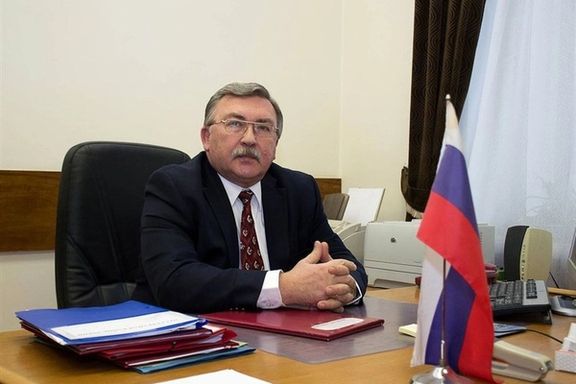Russian Envoy Opens Lid On Iran Nuclear Talks

Russian envoy to the Vienna nuclear talks has revealed that Iran's centrifuges, devices used to enrich uranium, are an "acute issue" in the negotiations.

Russian envoy to the Vienna nuclear talks has revealed that Iran's centrifuges, devices used to enrich uranium, are an "acute issue" in the negotiations.
"There is an option to transfer them abroad, there is an option to destroy them,” Mikhail Ulyanov was quoted by the official news agency Tass Monday as saying. “There is also an option to stockpile them in Iran and put them under IAEA guarantees, seal them and so on. We can agree on what option to use.”
Ulyanov revealed that “this is only one of tens of issues that we will have to resolve.” Talks were progressing "not too fast", but still "moving forward," he said.
Tehran has yet not reacted to Ulyanov's disclosure. In a tweet Tuesday, top negotiator Ali Bagheri-Kani said European negotiators – those of France, Germany, and the United Kingdom – were persisting in a "blame game habit instead of real diplomacy."
The day before, senior diplomats from the ‘E3’ offered a pessimistic evaluation of the talks in a statement. Neither the E3 statement nor the Bagheri-Kani tweet referred to discussions about centrifuges, and the E3 statement seemed to contradict any notion, like Ulyanov’s, that the talks had reached nitty-gritty issues.
"We proposed our ideas early and worked constructively and flexibly to narrow gaps; diplomacy is a two-way street,” Bagheri-Kani wrote. “If there's real will to remedy the culprit's [the US] wrongdoing, [the] way for [a] quick good deal will be paved.”
The E3 statement claimed "time was running out" to rescue the JCPOA, which would become "an empty shell" as they had not yet "not been able to get down to real negotiations" with Iran.
US Secretary of State Antony Blinken said Tuesday at a news conference in Indonesia that while pursuing diplomacy, Washington was "actively engaging with allies and partners on alternatives." This followed a flurry of reports on US discussions with Israel on attacking Iran. Given it left the JCPOA in 2018, the US is involved in the Vienna talks indirectly.
According to Iranian and Russian readouts of a telephone call Monday, Russian foreign minister Sergey Lavrov told Iran’s Foreign Minister, Hossein Amir-Abdollahian, that all US sanctions are “inconsistent with the JCPOA” should be removed.
Iranian government spokesman, Ali Bahadori-Jahromi said Tuesday that the “West” wanted “to keep and even increase sanctions.”
Spinning centrifuges
Iran’s use of centrifuges has reportedly been a central issue in the talks that began in April. The JCPOA limited Iran to 6,100 centrifuges, nearly all first-generation IR-1s.
Since the US left the deal and imposed ‘maximum pressure’ sanctions, Iran has introduced more advanced and efficient centrifuges including the IR-4, IR-5, and IR-6, and used them to enrich and stockpile uranium enriched to 20 percent and 60 percent. Under the JCPOA Iran enriched only to 3.67 percent.
But returning to JCPOA limits has been complicated by Israel attacks that destroyed older centrifuges – some have claimed that 90 percent of centrifuges at the Natanz plantwere unusable – that Iran has replaced with more advanced ones. Back in April, then president Hassan Rouhani made great show of inaugurating new centrifuges following the “terrorist” strikes.
On the third day of the latest round of talks beginning November 29, the International Atomic Energy Agency said Tehran had at the underground Fordow facility started enrichment to 20 percent purity with a cascade of 166 advanced IR-6 machines.
Iran's 1044 IR-1 centrifuges, set up in six cascades, are still being used for 20 percent enrichment. According a later IAEA report of December 1, another 94 IR-6 machines have been installed at Fordow but are not yet operating.